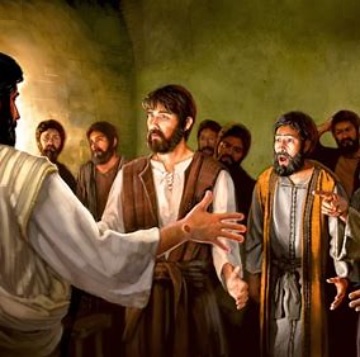“Go therefore and make disciples of all the nations…teaching them to observe all that I commanded you; and lo, I am with you always, even to the end of the age” (Matthew 28:19-20, NASB).
——————–
Contents:
1) Four Anchors of Life (Gordon J. Pennock)
2) Cultivating the Soil (Heath Rogers)
3) An Acrostic from the Word “Messiah” (video sermon, Tom Edwards)
4) News & Notes
——————–

-1-
Four Anchors of Life
Gordon J. Pennock
The shipwreck of Paul and his company as they were enroute to Rome is recorded in the 27th chapter of Acts. This was but one of the many harrowing experiences he suffered in his service to Christ. Of course, the sailors did all in their power to prevent a disaster, but without avail. When doom seemed inevitable they finally “let go four anchors from the stern, and wished for the day” (Acts 27:29).
Apparently this ship was well prepared for trouble. Four trusty anchors weighed at the stern. These were needless and useless when the weather was fair and the going was good. But what a blessing they proved to be when the tempests blew and the vessel was threatened upon the rocks of the Melita coast.
Human souls, like ships, are riding upon the “sea of life.” Our course is set and we are making our way toward the distant shore. For most of us the weather is fair, the sea is calm and the sailing is smooth. But let us not deceive ourselves into thinking that it will always thus be. Somewhere upon the sea of life there is always a storm raging and a tempest blowing. In every tempest and in every storm, ships are rolling and tossing. Some will outride the storm and finally drop anchor in “The haven of rest,” while others will break up upon the waves and the rocks and go down to despair and ruin.
Surely, for us the question is not, shall we sail the sea of life? Sail it we must. Neither is it a question of whether or not we will encounter storms. They are inescapable. The urgent question is this: Do we, like the ship upon which Paul sailed, have trusty anchors waiting and ready to do their work when the need arises.
There are four anchors with which every human vessel needs to be equipped. The first one is an unfaltering
Faith in God and In The Bible As His Word
Without faith in God, “it is impossible to be well-pleasing unto him; for he that cometh to God must believe that he is, and that he is a rewarder of them that seek after him” (Heb. 11:6). The remainder of this chapter gives example after example of men who lived and triumphed by unfaltering faith in God. And where there is real faith in God, there is faith, trust and confidence in His word. Such will believe and obey everything that the Bible records or enjoins upon them. They will abide in its teaching and refuse to go forward upon the wisdom of men, regardless of how celebrated they may be. Although our feeble minds may stagger at the profundity of His teaching, or even its simplicity, let us believe it and be governed by it. Where faith is as it should be, there will be complete obedience to God. “Faith without works is dead” (Jas. 2:26).
Prayer
Prayer is another anchor which may well stay us in the hour of trial. “Prayer is the power that moves the hand that moves the universe.” In prayer, the Christian speaks to God. No day should begin or close without it. His we are and Him we serve. Nothing short of presumption would allow us to live without prayer. Jesus, our example, taught that we “ought always to pray, and not to faint.” Read Luke 18:1-8. Truly, “more things are wrought by prayer than this world ever dreams of.”
A Good Conscience
Paul exhorted young Timothy to hold “a good conscience; which some having thrust from them made shipwreck concerning the faith” (I Tim. 1:19). Certainly, to discard or overlook this anchor is disastrous. Honesty of heart and sincerity of purpose are indispensable. The one who knows the truth, but holds it not with a good conscience is condemned in the sight of God. Neither, of course, can sincerity and conscientiousness approve one before God if it is not related and devoted to the truth of God. Let us continually rely upon God’s word to teach us the truth, and having learned it, let us hold to it with a good conscience.
Hope
Another anchor is that of hope — a hope that is confident that God will keep his promises. We have “strong encouragement” in that God’s counsel is unchangeable and that it is impossible for Him to lie. His promises concerning the future can be entertained with the same certainty with which we believe the happenings of the past. This blessed hope is “an anchor of the soul, both sure and steadfast” (Heb. 6:19). The winds and the waves may roar; our frail vessels may toss and tumble in the tempest, but if “we have our hope set on the living God,” then we will outride the storm and finally land in the “glory land.”
My fellow voyager, how are your anchors? You had better check them and be sure that they are in place and ready for a time of trouble. You will need them before the voyage is ended.
— Via Truth Magazine I:11, pp. 1, 20, August 1957, https://www.truthmagazine.com/archives/volume1/TM001098.htm
——————-

-2-
Cultivating the Soil
Heath Rogers
The Parable of the Sower presents us with four different kinds of soils – the wayside soil, stony ground, thorny soil, and good soil (Matt. 13:3-9). These soils represent four different kinds of hearts into which the word of God can fall (vs. 18-23). This parable is a good explanation for why some people don’t respond to the gospel, or why some respond but don’t remain faithful. We see people walk away from the gospel call or fall away from the Lord and know the truths shown in this parable apply to them.
I want us to consider the fact that both soils and hearts can be changed.
The wayside heart is the hardened heart that is not ready to receive the word of God. Hearts can be broken and made receptive to the word. “Sow for yourselves righteousness; reap in mercy; break up your fallow ground, for it is time to seek the Lord, till He comes and rains righteousness on you” (Hosea 10:12, emphasis mine – HR). Plowing and tilling slices and beats the ground apart. It is a harsh process. Often it takes a traumatic event to break apart a wayside heart, but it can be done.
The stony heart is shallow. It receives the word with joy but has no room for it to grow and develop. We can avoid and overcome emotional impulsiveness by counting the cost (Luke 14:25-33). A contractor knows that not every day is going to be a ribbon cutting ceremony. Many days involve backbreaking work.
People who fail to read the fine print and hurriedly sign a contract are often the ones who want out of it when things go bad. The ones who take their time and find out what they were getting into are more likely to stick with it. We need the emotion of the stony heart, but we also need the depth of character to honor our commitments.
The thorny heart is crowded and preoccupied. It receives the word but has no room or resources to spare for needed growth and development. The “cares of this world and the deceitfulness of riches choke the word” (Matt. 13:22).
There is nothing wrong with having cares, riches, pleasures, and desires. The problem is when we allow them to take over our hearts. When we put first things first (Matt. 6:33), we become better listeners and are more willing to make application of the things we hear.
The good heart is one that is receptive, deep, and uncrowded. Such a person “hears the word and understands it, who indeed bears fruit and produces: some a hundredfold, some sixty, some thirty” (Matt. 13:23). We all want to have the good and honest heart.
However, good hearts can change for the worse. “Beware, brethren, lest there be in any of you an evil heart of unbelief in departing from the living God; but exhort one another daily, while it is called ‘Today,’ lest any of you be hardened through the deceitfulness of sin” (Heb. 3:12-13).
What kind of heart do you have? The hard heart can be softened, the shallow heart can be deepened, and the crowded heart can be cleared. Do some soil inspecting and make the changes you find are needed. If you have a good heart, don’t grow weary in doing good. Keep your heart with all diligence and continue to bear fruit with patience.
— Via Articles from the Knollwood church of Christ, April 2022
——————–
-3-
An Acrostic from the Word “Messiah”
Tom Edwards
For the video sermon with the above title, just click on this following link:
https://thomastedwards.com/wordpress/Messiah_042422.mp4
——————–
-4-
News & Notes
Folks to remember in prayer, due to their health:
Jim Lively had another bad fall on his right leg Sunday morning. It is the same leg that much skin had sloughed off from a fall a few weeks prior and had not healed up yet. So he has been having some pain with that.
Donald Sears recently saw his doctor. Though the blood work shows no sign of cancer, yet he does have a spot near the surgery site in his neck that could possibly develop into cancer. So that will be treated with radiation to eliminate it. Now that his nerves are working better than right after the surgery, he has been feeling much pain.
June Peters will soon begin radiation treatments for her cancer.
Alex Cornelius has completed his rehab, but is still having pain, following his accident.
Rick Cuthbertson’s recent scans show that he has not developed any more tumors. Plus there has been a shrinkage with the ones he does have. Also, the last 3 weeks of treatment has him feeling much better than the 3 previous weeks that had him on a higher dosage.
Though Ronnie Davis has to continue on oxygen 24 hours a day, yet he is also making some improvement!
Let us also continue to remember the following in prayer: Rex Hadley, A.J. & Pat Joyner, Myrna Jordan, Doyle Rittenhouse, Tammy Griffey, Deborah Medlock, Lois Fletcher, Vivian Foster, Danielle Bartlett, Kayla Williams, and Kim Rowell.
Next Sunday at 5 p.m., we will have our first-Sunday-of-the-month song service.
——————–
The Steps That Lead to Eternal Salvation
1) Hear the gospel — for that is how faith comes (Rom. 10:17; John 20:30-31).
2) Believe in the deity of Jesus Christ, the Son of God (John 8:24; John 3:18).
3) Repent of sins. For every accountable person has sinned (Romans 3:23; Romans 3:10), which causes one to be spiritually dead (Ephesians 2:1) and separated from God (Isaiah 59:1-2; Romans 6:23). Therefore, repentance of sin is necessary (Luke 13:5; Acts 17:30). For whether the sin seems great or small, there will still be the same penalty for either (Matt. 12:36-37; 2 Cor. 5:10) — and even for a lie (Rev. 21:8).
4) Confess faith in Christ (Rom. 10:9-10; Acts 8:36-38).
5) Be baptized in water for the remission of sins (Mark 16:16; Acts 2:38; 22:16; 1 Pet. 3:21). This is the final step that puts one into Christ (Gal. 3:26-27). For from that baptism, one is then raised as a new creature (2 Cor. 5:17), having all sins forgiven and beginning a new life as a Christian (Rom. 6:3-4). For the one being baptized does so “through faith in the working of God” (Col. 2:12). In other words, believing that God will keep His word and forgive after one submits to these necessary steps. And now as a Christian, we then need to…
6) Continue in the faith by living for the Lord; for, if not, salvation can be lost (Matt. 24:13; Heb. 10:36-39; Rev. 2:10; 2 Pet. 2:20-22).
——————–
Tebeau Street
CHURCH OF CHRIST
1402 Tebeau Street, Waycross, GA 31501
Sunday: 9 a.m. Bible Class and 10 a.m. Worship Service. We also have a Song Service at 5 p.m. for every first Sunday of the month.
We will resume our Wednesday class on June 1, 2022 at 7 p.m.
evangelist/editor: Tom Edwards (912) 281-9917
Tom@ThomasTEdwards.com
https://thomastedwards.com/go/all.htm (This is a link to the older version of the Gospel Observer website, but with bulletins going back to March 4, 1990.)

